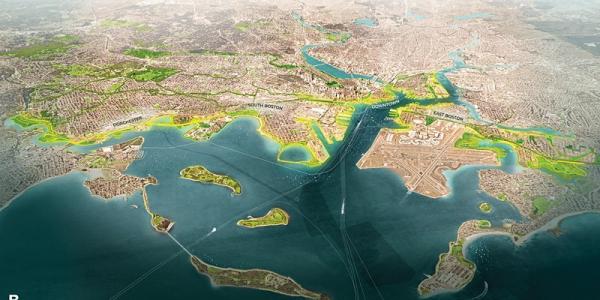October 28, 2020

A rendering from the city of Boston's Climate Ready Dorchester project.
For scientists and many citizens alike, the everyday occurrences of massive storms, uncontrolled wildfires, unprecedented floods, and other weather-driven disasters are clear evidence of the danger that climate change poses to the planet.
In our corner of the world, the northeast United States, experts say, climate change appears in subtler ways. While a roaring “northeaster” is anything but understated, it’s somewhat infrequent. The more common experience in our neighborhood is extreme heat.
“Growing up in the city, people are taught to deal with hot summers, but they’re getting hotter and hotter,” said Christopher Cook, chief of Environment, Energy and Open Space for the City of Boston. “Energy-burdened communities that can’t have air conditioning all the time are already feeling the impacts.”
And those impacts aren’t the same across the board. Researchers at UMass Boston’s Sustainability Solutions Lab have found that sentiments about impacts from climate change — and the level of preparedness to handle them — is inconsistent across population groups.
Paul Watanabe and Lorena Estrada-Martinez have just published their findings in a report entitled “Views that Matter: Race and Opinions on Climate Change of Boston Area Residents.”
It’s the first time that a study has included enough people of color from Boston neighborhoods to allow for a meaningful analysis of data by race, according to Estrada-Martinez.
“We wanted to focus on vulnerable and underserved communities and how they’re particularly impacted by climate change,” said Watanabe. “Their views are too often absent from the discussion.”
First, the common ground: Boston residents generally agree that climate change is currently, or will do so soon, causing increased coastal flooding, rising sea levels, heat waves, and extreme storms. And for that majority who believe climate change is “probably happening,” all share the view that if nothing is done to address climate change, that inaction poses a “very” or “somewhat serious” problem.
However, communities of color are more inclined than whites to identify climate change as a “serious problem,” and they are less likely to claim that not addressing climate change will lead to consequences that are “not too serious” or “not serious at all.”
White respondents were more likely to believe that climate change would have an unequal impact on communities of color, with 43 percent believing that climate change will affect people of color more than whites. And in terms of preparedness, there are significant variations between whites and residents of color.
For example, 74 percent of white residents self-report having insurance to protect their home and belongings, compared to 57 percent of Blacks, and 54 percent of Latinx and Asian Americans.
There’s a shared view among all groups surveyed that government has a responsibility to take the lead on climate change — and that includes on the municipal level as well as state and federal.
One key benefit of the UMass study is that it provides more understanding for policy-makers about the variations in opinions and beliefs across different racial groups, which helps drive catered communication, outreach, and education to targeted groups in a way they will improve receipt and understanding.
The city of Boston has allocated about 10 percent of its capital budget to climate change resiliency and is engaging in a number of initiatives to plan it out. Climate Ready Dorchester is a comprehensive plan drawn up to address coastal flooding and resiliency in the harborside neighborhood.
This past week brought repeated reminders of just how vulnerable coastal Dorchester remains to tidal events: Morrissey Boulevard was inundated by harbor waters for several consecutive days.
On Thursday (Oct. 29) at noon, the Climate Ready initiative will host a presentation by coordinators announcing initiatives downtown and in the North End and Dorchester, followed by a Q&A. The event will be recorded for future viewing.
Two additional city-sponsored initiatives are Greenovate, a climate change leadership training program open to all Boston residents and actively recruiting representatives from communities of color, and the Community Choice Electricity program, which offers renewable energy options at comparable or lower rates than standard utility companies.
But necessary action isn’t limited to government, and survey respondents overwhelmingly noted the changes required in their own lives to help combat climate change.
“People have to change their own behavior in facing this climate crisis. Unless we do so, it’s going to negatively impact health and contribute to more challenges in the future,” said Watanabe. “How much of your lifestyle will have to change to address climate change? But how much of your lifestyle will be forced to change if we don’t address climate change?”
Along with everything else in our lives, the coronavirus has underscored the challenges, particularly in neighborhoods of color. Cooling centers weren’t able to open this summer because of the concerns of spreading the virus.
“The old ways of doing things may not work. What are the lessons we can learn from COVID-19 and apply to our future emergency planning and adaptation efforts?” said Christopher Cook. “The bottom line is we’re not going to be successful unless we include the communities that are most impacted.”
Erin Caldwell is a Dorchester resident.


